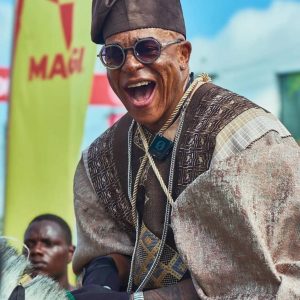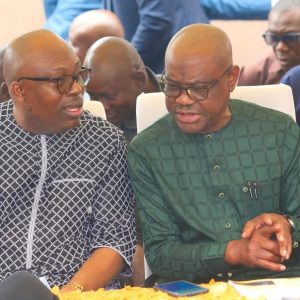Ali Dalori, the deputy national chairman (North) of the All Progressives Congress (APC), has taken over as the acting national chairman of the ruling party following the resignation of Abdullahi Ganduje, the former national chairman, on Friday.
This is in line with the party’s constitution, which stipulates that in the event of a chairman’s absence or exit from office, the deputy national chairman from the geographical zone as the chairman shall step in to oversee the party’s affairs in acting capacity.
Section 14(2)(iii) of the constitution states that the deputy national chairman “shall act as the National Chairman in the absence of the National Chairman from his Zone.”

Therefore, if a sitting national chairman resigns, becomes ill, or is unable to continue in office, the deputy national chairman from the same zone automatically steps in as the acting national chairman.
Mr Ganduje is from Kano State in the northern zone while Mr Dalori hails from Borno State in the same zone.
The party has two deputy national chairmen. Emma Eneukwu, from Enugu State, is the deputy national chairman (South). He is a former national publicity secretary of the defunct All Nigeria Peoples Party (ANPP).
Mr Dalori was appointed as the deputy national chairman (North) in August 2023, following the exit of Abubakar Kyari, who vacated the position after being appointed as the Minister of Agriculture and Food Security by President Bola Tinubu.
He will be in office until a new chairman is appointed or elected at the party’s national convention.
Before his elevation to the National Working Committee (NWC), he had served as the chairman of the APC in Borno State, where he built a reputation with grassroots influence in the North-east.
Ganduje’s controversial exit
Mr Ganduje’s short tenure as APC National Chairman, which began in August 2023, was marred by controversy.
Prior to his appointment as chairman, Mr Ganduje served as the governor of Kano State from 2015 to 2023. He became the national chairman at a time when the ruling party was grappling with post-election tensions, leadership restructuring, and ideological divisions among its ranks.
While Mr Ganduje’s resignation letter attributes his decision to health concerns, sources familiar with the matter suggest that political tension within the party and allegation of corruption also played a role in his decision to step down.

Party members have reportedly protested excessive financial demands from Mr Ganduje’s office. Specifically, those aspiring for area council positions in the Federal Capital Territory (FCT), had reportedly alleged that exorbitant fees were being imposed on them as a condition for securing party nomination tickets.
Six chairpersons in 12 years
Mr Ganduje, a former member of the Peoples Democratic Party (PDP), was the sixth person to lead the APC since its formation in 2013 following the successful merger of some opposition parties at the time.
The parties were the Action Congress of Nigeria (ACN), Congress for Progressive Change (CPC), All Nigeria Peoples Party (ANPP) and section of the All Progressives Grand Alliance (APGA).
A former governor of Osun State, Bisi Akande, was the first interim chairman of the party. He was succeeded by a former governor of Edo State, John Oyegun, who was also succeeded by another former governor of the state, Adams Oshiomhole.
Incumbent governor of Yobe State, Mala Buni, stepped in as a caretaker committee chairman after Mr Oshiomhole’s exit in controversial circumstances.
Former governor of Nasarawa State, Abdullahi Adamu, succeeded Mr Buni, and upon his resignation, Mr Ganduje assumed office.
Stay ahead with the latest updates!
Join The Podium Media on WhatsApp for real-time news alerts, breaking stories, and exclusive content delivered straight to your phone. Don’t miss a headline — subscribe now!
Chat with Us on WhatsApp






